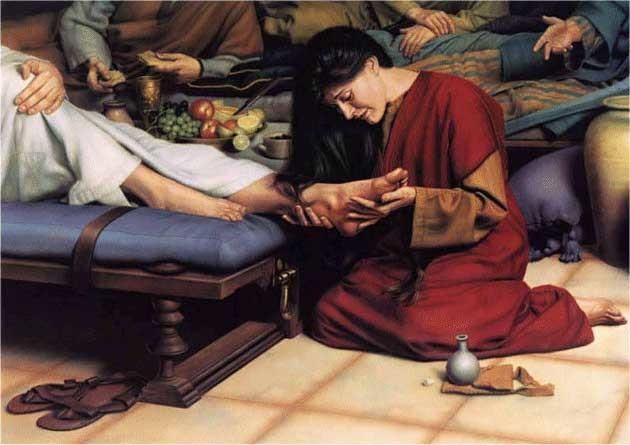The text is below the video…
Almighty God, whose most dear Son went not up to joy but first he suffered pain, and entered not into glory before he was crucified: Mercifully grant that we, walking in the way of the cross, may find it none other than the way of life and peace; through Jesus Christ your Son our Lord, who lives and reigns with you and the Holy Spirit, one God, for ever and ever. Amen.
John 12:1-11
Six days before the Passover Jesus came to Bethany, the home of Lazarus, whom he had raised from the dead. There they gave a dinner for him. Martha served, and Lazarus was one of those at the table with him. Mary took a pound of costly perfume made of pure nard, anointed Jesus’ feet, and wiped them with her hair. The house was filled with the fragrance of the perfume. But Judas Iscariot, one of his disciples (the one who was about to betray him), said, “Why was this perfume not sold for three hundred denarii and the money given to the poor?” (He said this not because he cared about the poor, but because he was a thief; he kept the common purse and used to steal what was put into it.) Jesus said, “Leave her alone. She bought it so that she might keep it for the day of my burial. You always have the poor with you, but you do not always have me.” When the great crowd of the Jews learned that he was there, they came not only because of Jesus but also to see Lazarus, whom he had raised from the dead. So the chief priests planned to put Lazarus to death as well, since it was on account of him that many of the Jews were deserting and were believing in Jesus.
This story, in different forms and contexts, is told in all four Gospels; when this happens it is as if we are reading something in bold font, underlined and in upper case letters. Luke is the only one to place the narrative in the north and it is Luke who suggests the woman is of “questionable character”; not so in John’s Gospel, it is Mary the sister of Martha whom Jesus loved – along with their brother Lazarus.
In other Gospels, the disciples whine amongst themselves about the so-called waste of precious ointment; it is only John who focuses on Judas.
What you and I see here is the most complete, utter, eloquent act of love and worship from Mary to Jesus… she does all this despite, no because of, the imminent death of Jesus. It is her love for Jesus that creates such an ache deep within her soul, it is her love for that resists paralysis and denial and (against all reason) executes this stellar, stunning act. Pascal “The heart has reasons that the mind cannot understand.”
Mary touches the feet of Jesus (anathema in Jewish law), she wipes them with her hair (an affront to all that is considerable proper) and, as the Gospels tell us, she weeps profusely.
Mary’s problem is this… because she loves Jesus so much, she hurts so much at the prospect of his death. If there were no love, there would be no vulnerability and, at the cost of being fully human, the transforming dynamic of being loved, of loving another would be lost. Can you not see the irony… the very act of love (anointing Jesus with pure nard) is also the act of preparing for his burial?
In Sarah Perry’s book “The Essex Serpent” Cora Seaborne writes this to the Reverend William Ransome:
“He said, ‘There are two words in the English language which are spelled the same, pronounced the same, but have opposite meanings. What are they?’ I couldn’t find the answer and then he said, ‘CLEAVE. TO cleave to something is to cling to it with all your heart but to cleave something apart is to break it up’”. In her letter Cora concludes, “We are cleaved together – we are cleaved apart – everything that draws me to you is everything that drives me away.”
You see, to love (to be close as if one) is also to be vulnerable and be ready to let go (as if apart).
Somehow Mary had the internal grit to admit her love while at the same time confront her imminent loss.
Whence comes this power? It comes by divine edict as Jesus says to all who would ignore, neglect, ridicule, harass Mary “Let her alone”.
In this week and in these days we pray for the same internal grit that Mary exhibits in our story and we want our lives, our homes, our nation to be filled with the sweet aroma of love enabling sacrifice, of love enabling honesty, of love enabling hope.

